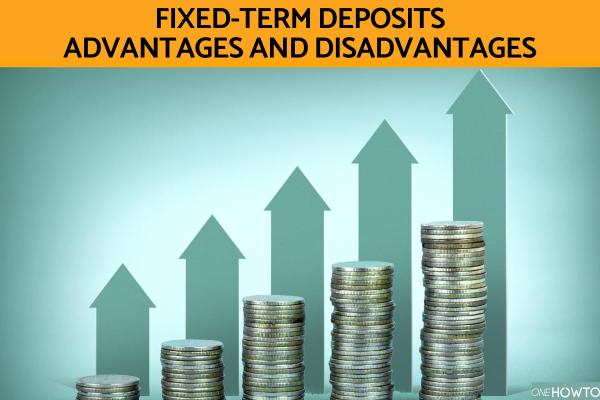Fixed-Term Deposit - Advantages and Disadvantages


Banks offer a series of financial schemes with which they try to attract as many customers as possible. In their portfolio, they offer different possibilities to adjust to the needs and interests of each potential client. In this sense, one of the products they usually have is a fixed-term deposit, considered a type of financial savings product.
Many people are interested in the financial products offered by their bank or building society, but they lack the necessary knowledge to contract them safely. It is important to put yourself in the hands of expert financial advisors who have your best interests in mind. You will also need to obtain in-depth information about the product before making an investment. To learn more, oneHOWTO explains the advantages and disadvantages of a fixed-term deposit to help you know if it is a product suitable for you.
What is a fixed-term deposit and what is it for?
Before you know their advantages and disadvantages, you will want to what is a fixed-term deposit? Also known as simply a fixed deposit (FD), it is a financial product through which an individual (person) or a company (a legal entity) deposits an amount of money in a financial institution for a certain period of time. They do so in exchange for remuneration at a previously set interest rate.
The payment of this interest can be made after the end of the specified period in full or periodically. This means the person or company might receive installments throughout the duration of the deposit. Liquidity must also be taken into consideration. In some cases, there may be a penalty if you want to use the money deposited before the end of the set period.
How a fixed-term deposit works
A fixed deposit is a way to make an investment of your savings in a simple and safe way. The essential function of how fixed deposits work is the following:
- You deposit a certain amount of money in the bank during a specific period of time. It can range from several months to a few years.
- In exchange, you receive remuneration for having that money blocked.
- The profitability that you are going to obtain is fixed. This means you will know the amount of money that you are going to earn from your fixed-term deposit from before it starts.
For example, with an investment of $40,000 in a fixed-term deposit with a duration of 12 months at 3.50% APR, the profitability will not vary during that entire period of time. From the beginning of the investment, you will know what you are going to earn: 40,000 x 0.035 = $1,400 gross profit.
The 1,400 gross euros is the benefit you obtain as a client for the fixed-term deposit. If this seems like very magnanimous behavior by the bank, they are also benefitting from the fixed deposit. For their part, the bank uses your capital to have greater liquidity for their operations. In other words, you are essentially lending money to the bank in exchange for obtaining financial interest.
How fixed-term deposits are taxed
The taxation of fixed-term deposits can vary by country and region. It is essential to consult with a tax professional or refer to local tax laws for specific guidance. However, here are some general principles that often apply to the taxation of fixed-term deposits:
- Interest income: the interest earned on fixed-term deposits is generally considered taxable income in most countries. When the interest is paid, it is added to your total income for the year and is subject to income tax.
- Withholding tax: in some countries, financial institutions are required to withhold a certain percentage of interest income and remit it directly to the tax authorities. This is known as withholding tax. The rate of withholding tax can vary depending on the country and the terms of any applicable tax treaties.
- Tax deductions: some countries may allow deductions or exemptions for interest income up to a certain amount or under specific circumstances. These deductions can reduce your taxable income.
- Tax reporting: in many countries, banks and financial institutions are required to report interest income to tax authorities. You should receive a tax statement or form from your bank detailing the interest earned on your fixed deposit. It's essential to include this information when filing your annual tax return.
- Capital gains tax: if you sell a fixed-term deposit before it matures and earn a profit, that profit may be subject to capital gains tax. The tax rate on capital gains can vary based on factors like the holding period and local tax laws.
- Tax-advantaged accounts: in some countries, there may be tax-advantaged savings or investment accounts that offer tax benefits for certain types of deposits or investments. These accounts can provide tax deferral or exemptions on interest income or capital gains.
- Estate tax: if you pass away and have fixed-term deposits as part of your estate, they may be subject to estate tax or inheritance tax, depending on your jurisdiction's laws.
It's crucial to stay informed about your local tax regulations and consult with a tax advisor or accountant to understand how fixed-term deposits are taxed in your specific situation. Additionally, consider the impact of taxes when comparing the returns on fixed-term deposits with other investment options, as taxes can significantly affect your net earnings.

Advantages and disadvantages of a fixed-term deposit
Now we know how it works, we will look at the advantages and disadvantages of a fixed deposit. These pros and cons will help you determine if a fixed-term deposit is for you or if it is better to use your savings in other ways.
Advantages of a fixed-term deposit
- Profitability without any type of risk: you know in advance what profitability you are going to obtain for your money.
- Quick contracting: the process of contracting a fixed-term deposit is very quick and easy to formalize.
- Guaranteed investment: the profitability obtained and the capital invested is assured. It has the support of the Federal Deposit Insurance Corporation (FDIC) which helps to protect you in the case of non-payment by the banking entity. Other deposit insurance schemes operate in different countries.
- Greater profitability depending on the maturity period: the longer this maturity period is, the more profitability you will obtain on the investment made.
Disadvantages of a fixed-term deposit
- Early cancellation: although some fixed-term deposits do not charge fees for early cancellation, most banks charge fees for early withdrawal of the deposited money.
- Reduced profitability: in the current financial market, the returns offered by these products are lower compared to other types of products.
- Immobilized capital: in cases where the financial institution does not allow early withdrawal, the client cannot use the invested capital until the agreed period ends.
To learn more about how to look after your finances, you can take a look at our related article on what are active and passive assets in accounting.
If you want to read similar articles to Fixed-Term Deposit - Advantages and Disadvantages, we recommend you visit our Personal Finance category.





